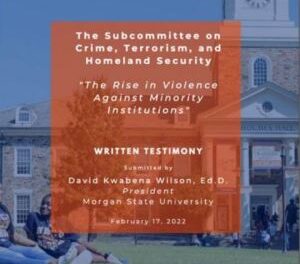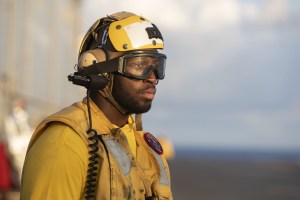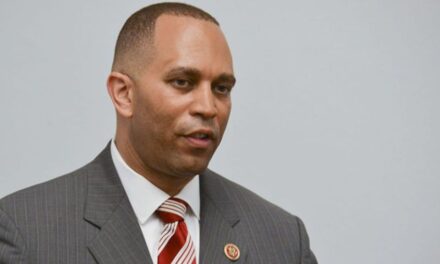By Deborah Bailey,
Contributing Editor
The Bowie State University – UMPC 5th Annual Social Justice Alliance Symposium held April 29 honoring the legacy of 1st Lt. Richard Collins III turned the attention of the hundreds gathered to the recent racial and social justice controversies in sports. Olympic Gold Medalist, Dominique Dawes, WNBA star Marissa Coleman, NBA, Sports columnist Washington Post sports columnist and UMD professor Kevin Blakistone, former Washington Wizards player, Eta Thomas, joined student athletes, Rainelle Jones, UMC Volleyball player and Zion Tyler, Bowie State University Track and field for a nothing is off the table, assessment of racial justice in the world of collegiate and professional athletics.
Tonia Walker, CIAA Associate Commissioner led the athletes in a hard-hitting panel discussion that brought the heat on a range of topics related to college sports and social justice, among them the inequity that is in danger of becoming institutionalized with the new NCAA Name, Image, Likeness (NIL) rules.
The NIL rules, adopted in June 2021 allows NCAA Division I, II and III student-athletes compensation for the use of their name, image or likeness whether the state has NIL laws in place. The new NIL rules will not override state, college/university or conference NIL rules.
But the rules have been widely criticized for being hastily put together creating a new class of student athletic “have and have nots” based on who actually receives compensation, according to the panelists.
Olympian Dominique Dawes dived right into the NIL controversy. “The top NIL athlete is not the greatest gymnast that’s out there,” Dawes said without hesitation.
“I don’t think the powers that be really took the time to investigate how NIL could impact sports. For the female athletes, the ones that are making the most money are the ones that are sexualized, unfortunately,” Dawes offered.

Villanova University’s Institute to Address Commercial Sexual Exploitation raised concerns about the sexualization of female college athletes involved with NIL endorsements in a December 2022 post.
“I understand why NIL was developed. Colleges are making an extraordinary amount of money on these athletes. However, I think there needs to be a little more thought about NIL,” Dawes stated.
“It’s a little more difficult if your sport is not football or basketball,” said Jones, emphasizing that women’s volleyball is not a sport that draws a premium level of endorsements outside of the elite NCAA volleyball teams.
Track and field athlete Zion Tyler, who attends Bowie State, mentioned HBCU athletes are often left out of the collegiate sports conversation on a variety of levels. “
“There’s three things that are needed right now, equity, inclusion and opportunity,” said Tyler.
“These three things are lacking at our HBCUs. We may not get the same NIL deals and the extra funding for our athletes. And it’s not because of a difference in talent. There’s plenty of talent at HBCUs. It is the opportunity to show their performance,” he said.
Here at Bowie State we’re in the middle of the forest. You go up the street to Ledo’s Pizza (five miles from campus) and they have the UMD gear,” said Tyler in reference to the lack of business located near the campus.
The closest restaurants and other businesses to Bowie State’s campus are located 2-3 miles away from the campus itself, restricting the campus-community integration that benefit many PWI’s, including the University of Maryland, with major businesses just a short walk across the street from campus.
A 2021 report from McKensie Institute on Black Economic Mobility supports Tyler’s concerns. According to the study, more than 80% of HBCUs are located in areas that fail to service Black consumers.
Frankki Bevins, lead author of the McKensie Black Economic Mobility Institute study writes “82 percent of HBCUs are in broadband deserts; 50 percent are in food deserts; and 35 percent are in areas without superstores that could offer consumers a full range of groceries, furniture, and clothing.”
Later in the program, Dawes and Thomas were awarded the Social Justice Alliance Trailblazer Award.
The Annual Social Justice Alliance Symposium in honor of the legacy of 1st Lieutenant Richard Collins III is a collaborative effort between Bowie State University, the University of Maryland College Park and the 2nd Lt. Richard Collins Foundation.
Lt. Collins had just been commissioned as an officer in the U.S. Army and was days away from graduating with his bachelor’s degree at Bowie State University when he was murdered on the University of Maryland College Park campus on May 20, 2017.
The 2nd Lt. Richard Collins III Foundation was created shortly after Collins’ death to eradicate intolerance, while confronting individuals and systems that normalize and justify injustice, hate and perpetuate violence. The foundation’s vision is to “command the mission of social justice.”
The post Black professional and collegiate athletes gather at Bowie State University for straight talk about racial and social justice in sports appeared first on AFRO American Newspapers .











